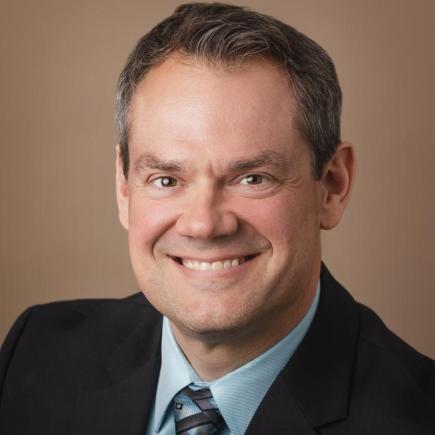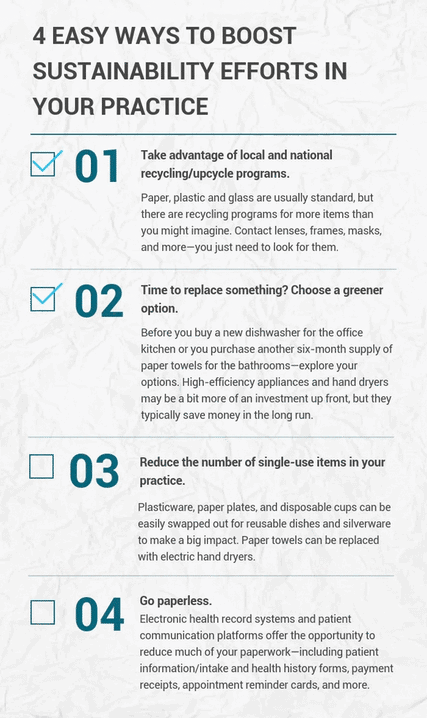
As American consumers grow increasingly conscious of supporting sustainable companies, many businesses—including eye care practices—have made efforts to be more “green.” In the midst of the challenges of the COVID-19 pandemic, making a positive impact on the environment presents a unique opportunity to set a practice apart and build a deeper connection with patients—all while contributing to a brighter future for the planet.
Eye care practices can take many approaches to being more sustainable, and even the smallest efforts make a difference. In this series, we’re featuring three doctors who have made sustainability a priority in their practices, but have done so via very different pathways. In part one, we shared how Dr. Katie Greiner incorporates sustainability into her discussions with contact lens patients. Now, we’ll look at how Michael Cymbor, OD, of Nittany Eye Associates in State College, Pa., has integrated his life-long passion for the environment into the culture of his practice.
“I’ve always cared about the environment,” said Dr. Cymbor. “As a kid, I was the one trying to save trees, and as an adult, I’ve done as much as anyone in terms of recycling and composting. Until more recently, however, these efforts were mostly in my home life.”
Like Dr. Greiner, Dr. Cymbor attended CooperVision’s clariti® 1 day experience in 2019, which provided eye care professionals the opportunity to see firsthand the company’s commitment to sustainability through its state-of-the-art manufacturing operations at its 100,000-square-foot facility in Alajuela, Costa Rica—a country known for its global leadership in sustainability.
“When I learned that 98% of Costa Rica’s energy is generated from sustainable resources, I was shocked. It really shed a light on how we could be doing better in the U.S.”

CooperVision’s Costa Rica facility holds the prestigious LEED® Silver certification for its environmentally conscious design and operation, which includes a high-efficiency lighting system using natural light, a vegetable oil-powered main transformer, and rainwater collection tanks. In addition, more than 95% of materials used in production—including 100% of the plastic generated—are recycled, and more than 95% of the plant’s electricity comes from renewable sources.
“Coming back from Costa Rica, my goal was to share that experience. In doing so, it surprised me to learn that sustainability already mattered to so many on our team—I just never knew. The clariti® 1 day experience rekindled that passion in me, and my renewed enthusiasm rekindled that passion in others. It really opened my eyes to what I could be doing in my practice.”
While Nittany Eye Associates had already been recycling contact lenses at its main location, upon Dr. Cymbor’s return from Costa Rica, he expanded it to include all four offices. In addition, his team started a composting initiative at their main office, and overall has been more conscious of sustainability in their decisions. For example, the practice utilized only compostable products at its summer picnic, and an employee buyback program helped eliminate the use of plasticware.
“The changes we’ve made have brought about a greater awareness in our practice,” Dr. Cymbor said. “In fact, we had a new member of our staff who had only been with us for about a week. During that time, my daughter came home from college, and she works at the practice part time when she’s here. Our new team member was eating lunch, and my daughter came into the room to eat as well—and was using plasticware. The team member, who had no idea who my daughter was, piped up and said ‘We don’t use that here. We use silverware because sustainability is really important to us.’ I thought it was perfect! It was wonderful that she had only been here for a week but had already picked up on that from us.”
Dr. Cymbor has found that the practice’s sustainability efforts resonate with its patients.
“We’re located in a university town, so we have a lot of patients who really care about the environment in a big way. And if it matters to my patients and it already matters to me, and we can do something about it—that’s a big win,” Dr. Cymbor said.
“Sometimes a patient will bring up how 1-day lenses seem to generate a lot more plastic waste than a monthly lens. I tell them about the clariti 1 day experience and all of the ways CooperVision conserves and recycles in their manufacturing in Costa Rica. I point out that through purchasing this lens, they’re supporting a company that understands sustainability. It’s a lens they can feel good about wearing.”
The team shares sustainability-related updates on its Nittany Eye Associates social media platforms, and is constantly looking for ways to engage patients in their sustainable practices. In addition to its contact lens recycling program, the practice started participating in a new TerraCycle program in 2020: mask recycling.
“With the COVID-19 pandemic, we saw our garbage bins filling up with masks every single day. We reached out to TerraCycle to ask if there were any opportunities; we found out they do have a program to recycle masks. They ship us a box, we fill it up, then ship it back. We are responsible for the shipping costs, but to us it is well worth it,” said Dr. Cymbor. “We started with recycling only masks from our staff, but we spread the word about it to our patients, and with enough interest, we’ll put a box out front and encourage them to drop off their masks for recycling as well.”
Dr. Cymbor is continuously working to be more sustainable by taking advantage of opportunities to make greener choices whenever possible. At home, he was able to sign up through a local energy company to utilize renewable resources, and when it came time to buy a new riding lawn mower, he opted for an electric model. A few months ago, when it came time to replace the roof on his house, he chose to invest in metal shingles, which will last at least 50 years and then can be left on as additional insulation. He plans to apply this same approach to any future maintenance on his practice buildings as well—and he knows his patients will be appreciative.
Dr. Cymbor believes it’s important for other eye care professionals to embrace sustainability in their own practices.
“Based on what I’m seeing both nationally and locally, the interest in sustainability is there. Now is the time to get on board; it’ll only bring good things to your practice. Your patients are going to recognize and appreciate you for it. And at some point, if you’re not riding this wave, the wave will ride you. I’m grateful for companies like CooperVision who are leading the way to show us how we can all do the work to help protect the environment.”








